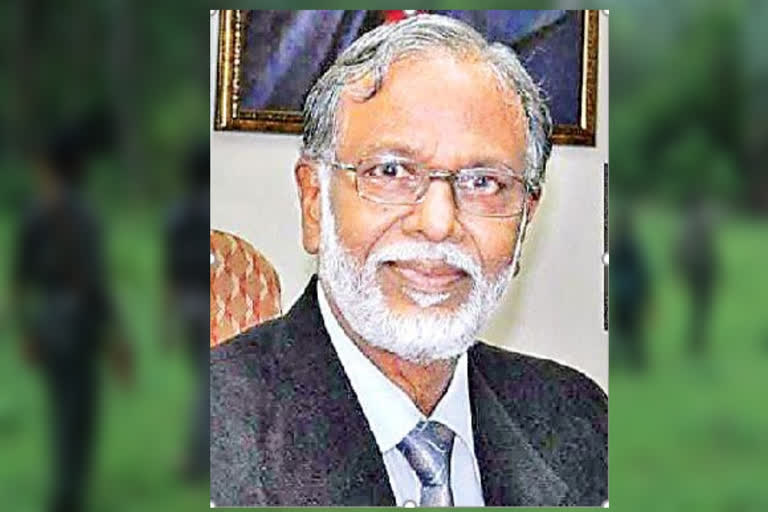Hyderabad: Complete vaccination is the only way to contain the pandemic. The virus is constantly mutating. Genome sequencing must be done to understand the dominant variants.
One of the reasons for the damage caused by the second wave is negligence in analyzing genome sequencing. Jacob John, the former head of the Centre for Advanced Research in Virology at ICMR, says that we must be proactive in preventing a devastating third wave.
In a special interview with ETV Bharat, he spoke about the severity of the infection and third wave.
Q: Why is the second wave in India so severe in comparison to other countries?
A: Two factors contributed to the severity. Firstly, we could not detect the mutation or the intensity of the spread. The Centre has assigned the responsibility to 10 research laboratories to monitor these issues. Together, they formed the Indian SARS-CoV-2 Genomics Consortium to undertake genome sequencing. But to the best of my knowledge, they are not sufficiently funded. It was only after the second wave began that the Consortium identified that there were new variants. Secondly, the government did not restrict mass gatherings across the country. Without the knowledge of new variants, people began throwing caution to the wind. Election rallies and campaigns have also contributed to the spread.
Q: There are doubts over the safety and efficacy of vaccines. What is your take?
There is no statistical basis for concern about whether the vaccine would work or not. Vaccines certainly give additional protection. However, we failed to supply enough doses. Few say that the vaccination could not prevent the second wave. There is no doubt that those who got two doses have better defence against the virus.
ALSO READ: Preparedness costs only fraction of impact of a pandemic but returns exponentially: Harsh Vardhan
Q: What is the role of genome sequencing in the current situation?
It is really important because the virus is quickly mutating. Few mutations are deadlier than in the first wave. Newer variants that are resistant to vaccination are also evolving. We need to think about those. We need to constantly monitor these mutations. Genome sequencing of virus samples should be analyzed every week. New variants should arrive as soon as possible.
Q: Some have suggested that the virus may become too resistant because of inadequate vaccination. Is that true?
A: Theoretically, it is possible but not practically true. This is unlikely to happen. What do they mean by inadequate? Is it giving just a single dose or vaccinating only a small percentage of the population? It is not right for people to refuse vaccine by believing such false claims. Countries like Israel have been significantly able to reduce the virus spread through extensive vaccination. We also must think of a way to vaccinate large sections of the population.
Q: What measures should the central and state governments take?
A: What needs to be done urgently is to prevent people from crowding and gathering. We must raise awareness about wearing a mask and maintaining physical distancing.
Q: When is the crisis likely to end?
A: The virus will not go away. However, the current crisis is likely to end by the end of June. The intensity of spread is similar across the country. At a national level, it may start coming down by May 6.
Q: What is the probability and intensity of the third wave, considering the current situation?
A: The intensity and the speed of the second wave have surprised me. The first was the Wuhan virus. Then came the D.614 variant. However, they are not responsible for the second wave. UK B1.1.7, South Africa 3.1.351, Brazil B1.1.7 are the important strains. Indian variants like B1.617 and B.1.618 also broke out. If we do not have the immunity to a newer variant, third wave may prove more fatal. Vaccines are quite powerful in preventing further infections. But we have a severe shortage of vaccines. People with diabetes, high blood pressure, heart disease, etc. may be at higher risk with continuing waves.
Q: How is post-COVID India going to be? What measures can be taken?
A: We have already seen how the lax on the part of people and government proved risky. We must remember that the virus is here to stay. Other nations have learnt this fact sooner. But we have not analyzed the reasons for the ghastly second wave. Our healthcare sector is overburdened. We have a dire shortage of medical equipment and personnel. In the first wave itself, our healthcare sector was about to collapse. So, one can imagine the scenario now. The central government should immediately set up a public health division and special officers must be appointed in 718 districts across the country. 2 to 3 per cent of GDP allocations should be made towards public health and 3 to 4 per cent towards universal healthcare.
There is no scientific basis for accurately predicting the third wave. Whether or not there would be a third wave is not the question. We must remember that the virus is here to stay with us. So, each one of us must get vaccinated. Anyone who is not is at greater risk!
ALSO READ: PM Modi gets emotional, remembers people who lost their lives during Covid pandemic



